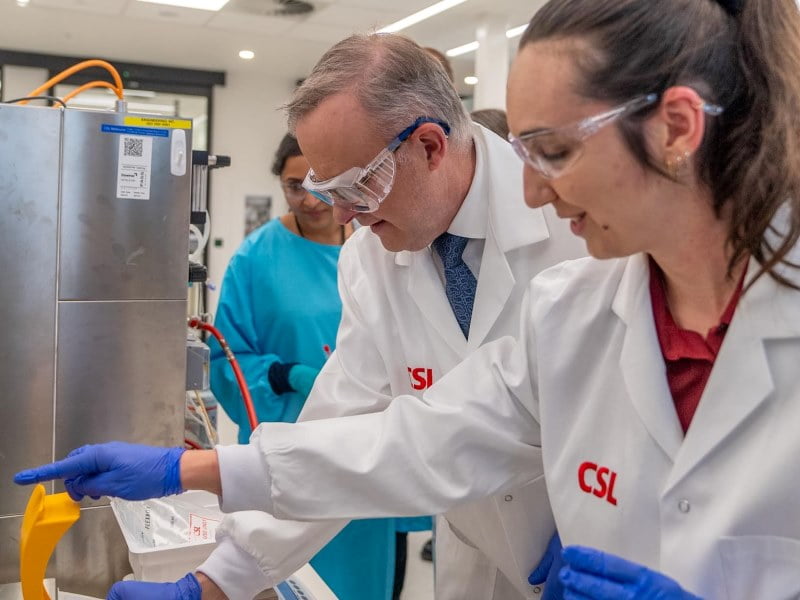The federal government is considering further support for parts of the RNA sector after helping establish the southern hemisphere’s first commercial mRNA manufacturing capability in Melbourne.
The Industry department on Monday open a consultation process to inform advice it will provide to the Albanese government on the RNA (or RiboNucleic Acid) technology industry and how to take full advantage of the “game changer” Moderna facility in Melbourne.
Research into RNA – a nucleic acid present in all living cells – has led to breakthroughs in vaccines, regenerative medicine and treatments for life threatening diseases.
A new Industry department discussion paper points to RNA as a proven biotechnology with massive potential for growth based on a strong history and research base in Australia. It asks stakeholders for input on how Australia can be globally competitive in “many niches”.

“One of the things that we know is that science and research and breakthroughs are significantly important for Australia’s future because we need to get ahead of the game,” Prime Minister Anthony Albanese said Monday at the launch of the new headquarters of CSL, which is investing more in RNA research and products.
“We need to be constantly looking for the next breakthrough because we are in a competitive world.”
The Albanes government has set aside $1.5 billion from the National Reconstruction Fund to invest in medical manufacturing projects, while another $1 billion has bee earmarked for both advanced manufacturing and critical technologies.
The $392 million Industry Growth is also expected to back pre-commercial or early-stage projects, including health technologies, while the development of RNA vaccines and clinical trials are funded by the $20 billion Medical Research Future Fund
The Australian and Victorian governments finalised a multi-billion dollar partnership last year with pharmaceutical giant Moderna to establish its Australian mRNA production facility.
It is expected to be operational by 2024 at Monash University’s Clayton Campus in Victoria, making Australia one of the few countries in the world – and the first country in the southern hemisphere – with a commercial mRNA manufacturing capability.
The facility is a “game changer” for the domestic RNA sector, according to the Industry department’s consultation.
“Australia’s RNA sector is already making an impact and could be at the forefront of developing and producing next generation RNA technology. It could deliver advanced manufacturing, sovereign capability and local jobs,” the discussion paper said.
“But there are challenges to overcome, including improving commercialisation, national coordination, workforce skilling and making the most of our infrastructure.”
There are “many niches” for Australia to be competitive in, with the mRNA COVID-19 vaccines representing only one and being built on decades of earlier RNA work.
“More discoveries in RNA production are likely to further disrupt health care, including more efficient production and logistics, improved thermostability and tolerance levels, and new products to treat diseases other than COVID-19,” the paper said.
“Better alignment between academia and industry will be important to advance RNA technology improvements and capture the economic and health benefits for Australia.”
The high export potential and potential new sovereign capability is why the Industry is developing advice to government on the potential of the RNA sector.
Industry minister Ed Husic said Australia could be a global producer of new RNA vaccine treatments.
“Australia has an impressive track record, overseeing some of the key breakthroughs that led to the development of mRNA vaccines globally,” he said.
“RNA technologies offer opportunities for Australia, from rebuilding onshore advanced manufacturing, boosting sovereign capability and creating highly skilled local jobs.
The consultation is seeking input from researchers, institutes, supply chain participants, other experts and state and territory governments on exactly where the focus should be over the next decade and what breakthroughs are needed to overcome roadblocks to a sustainable industry.
The consultation is open for the next eight weeks.
Do you know more? Contact James Riley via Email.

